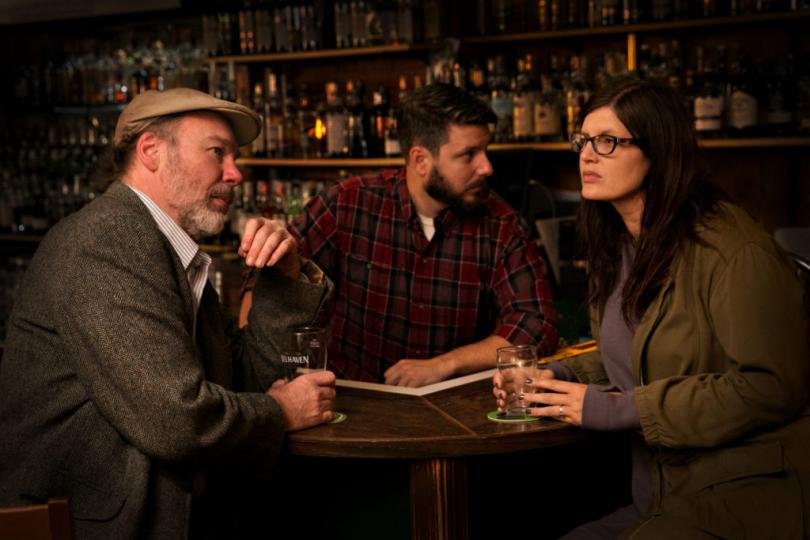The ‘Wayward’ Weir

Connor McPherson is considered one of the best contemporary Irish playwrights of our time and he’s only 46. His play, The Weir, was voted one of the 100 most significant plays of the 20th Century in a poll conducted by the Royal National Theatre, London. It tied at 40th place with such tour de forces as, Eugene O'Neill's The Iceman Cometh, Samuel Beckett's Endgame and Arthur Miller's A View From The Bridge! McPherson won the Critics' Circle Award as the most promising playwright in 1998 as a direct result of the success of The Weir and the play has received lofty praise, such as "beautifully devious," “delicately crafted work," “...a modern masterpiece."
So what makes this play such a “modern masterpiece” and how can it hold it’s own among some of the biggest names and most notable plays in modern theatre? In my opinion? It skillfully examines the human nature of hope versus defeat and regret and illustrates humor as the ultimate defense mechanism. In essence it’s the telling of ghost stories in the hopes of staving off the ghosts we will eventually become and, the magical use of creative imagination to mask the fear and reality of our mortality....how morbid, how meta, how Irish!
One of two productions running in the Cities, Wayward Theatre Company tackles the subtle beauty of this deep, dark comedy. Set in the new Cabaret space at Urban Growler Brewery it is perfectly site specific. The little theater space is through the main bar where Wayward and their design team have created a provincial intimate Sligo County setting.
Encouraged to grab a drink from the brewery, I got myself a Candy Corn Imperial Cream Ale, I was ready to relax and enjoy. What better way to spend a Halloween night than by listening to Irish ghost stories? The “bartender” (BRENDAN played by Tim McVean) came into the space soon after the house was open to start setting up the bar for the day’s business. Folding dishtowels, stoking the fire, checking the taps, I’m not always a fan of actors on stage during the pre-show, but because of the realistic bar setting, having the bartender sweeping the floor getting ready for the day was authentic and compelling (except don’t sweep the bar dust off into the ice, ick). Contemporary and traditional Irish music played in the background as he worked, singing along every once and awhile was fun, and watching the audience come in with their beers, almost as if they were bar patrons, was very clever.
Enter JACK (Arthur Moss), and the action begins. Typical talk about the wind and weather, land, work, girls, ensue. We get a little back story on the characters as then enter. JIM (Lucas Gerstner) is Jack’s assistant at the mechanic shop (side note: I did NOT see Jack as a mechanic even though he says it, Mr. Moss read more of an absent minded yet erudite professor than blue collar elbow greased mechanic). FINBAR (Edwin Strout) saunters in with the prize mare on his arm (new city girl VALERIE played by Sarah Nargang) and all the “boys” begin to vie for her attention by regaling her with tales of the town, the people, and the history of it’s supernatural. The ensemble does a wonderful job navigating the relationships, old and new, embracing the colloquial language with solid Irish accents (aptly coached by Foster Johns), and circling each other in search of that elusive human connection. Here in lies the essence of McPherson and the tragedy in the play: Everyone has a story to tell, one more grandiose and unbelievable than the next, but they’re all just fantastical stories with very little meaning or truth. No one is sharing anything real, or fostering any honest connection. The characters continue to orbit one another hoping for someone else to break through. Until SHE finally does.
Valarie, having listened patiently to all the bravado from the men around her, finally admits to why she’s moved from Dublin to the country. No spoilers here, It has broken her marriage and cracked her spirit seemingly beyond repair, even more so, she has been having some super natural experiences of her own to contend with, and it has her craving real comfort and connection. This kernel of truth is sobering (literally) for everyone. Nargang does a simple honest job of telling this difficult tale and it’s heartbreaking to listen to, even if it comes a little out of nowhere. Jack takes this opportunity to bare his soul in an epic monologue at the end of the play that also uncovers the source of his unhappiness and regret and, even though the bloom is off the proverbial Irish rose...the play ends with a cynical optimism and, ultimately, hope. We’re still alive, still kicking, and will live to see another day.
The production is solid from start to finish, with the highlights being the dueling personalities of Jack and Finbar. Moss and Strout have an easy confidence that allows them to rib each other effortlessly like actual old friends battling over the meaning of life and success. Nargang is awkwardly polite and sweet if not a little too quiet sometimes yet handles the “boys” with grace and appreciation. Brendan and Jim are the most tertiary yet do their job to regulate the chaos as necessary.
As aforementioned the design is spot on, the bar is dark and cozy, music classic, and exposed light bulbs appropriately rustic. I wasn’t a fan of the lights dimming when the “stories” were being told. At first I thought I was going a little crazy and that my eyes were dilating weirdly, but then I realized it was a design choice. It was perhaps a little too precious and made me feel like I had “better listen to this if I listen to anything,” and it directed focus in a cinematic way I thought was a little unnecessary. The staging was good, in a tough space with pillars in the audience, I specifically sat near one to see if it would be an issue. Director Michael Kelley did not leave my view obstructed for any length of time and kept the characters moving around the space well. A couple of times Jim and Jack left a paper or a drink unfinished to go to the outer points of the set, it seemed a little forced- in order to use the whole stage but seriously...minor details.
All in all I really enjoyed my time in Sligo. Enjoyed? Maybe appreciated is a better word. The slice of life that was represented was natural and relatable and I truly felt drawn into the Irish County and these imperfect yet hopeful characters. Life is inherently tragic if you acknowledge that the only real truth is death. It’s what you DO with your life and the time you have, the people you meet and learn to love that allows you to keep faith that inspires you to keep living until the end. This complex yet unfettered play explains this as clearly as anything can. If you’re not familiar with Mr. McPherson, I suggest you go and read some of his cannon, and MORE importantly, you still have several opportunities to see Wayward Theatre Company’s lovely production of The Weir before they close it out this coming weekend. I recommend that you do.




